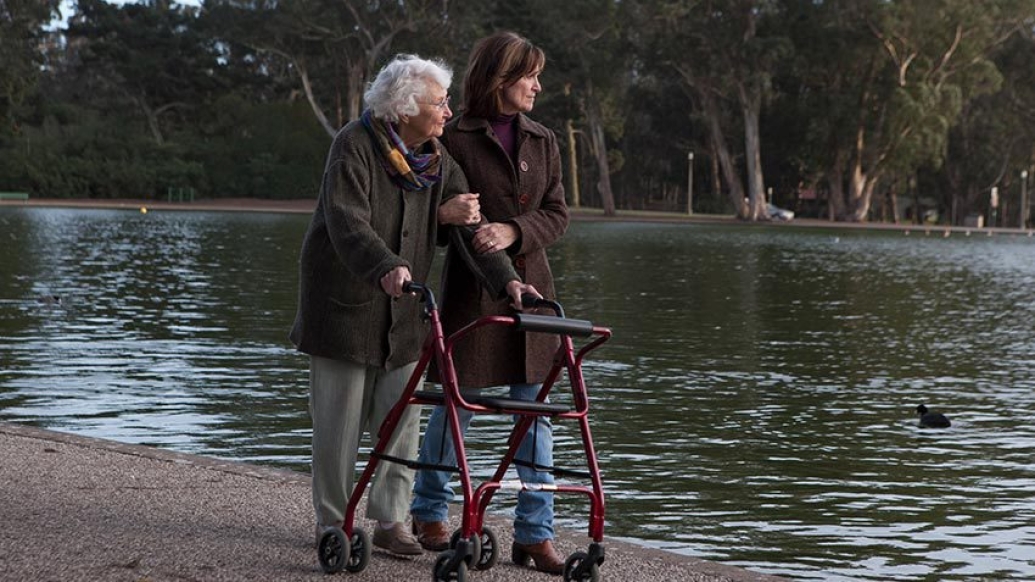Researchers call for health care institutions to take heed when making decisions about COVID-19 policies regarding caregivers.
8:58 AM
Author |

For the millions of older Americans who take care of a loved one with major medical needs, the pandemic has posed special challenges – and the resulting feelings of stress, depression and isolation may affect how well they can perform their caregiving responsibilities, a new study suggests.
The findings highlight the importance of considering unpaid caregivers, as well as patients, when health systems, clinics and public policymakers make decisions related to the pandemic and beyond.
Published in the journal Innovation in Aging, the study uses data gathered through the National Poll on Healthy Aging to explore the experiences of people between the ages of 50 and 80 who provide unpaid care for an adult relative or friend with a chronic illness or disability.
Though the poll was taken in mid-2020, the findings have implications during the current surge of COVID-19 cases across the country, and beyond, says Amanda Leggett, Ph.D., first author and a research assistant professor in the Department of Psychiatry at Michigan Medicine, the University of Michigan's academic medical center.
Leggett and colleagues are also conducting ongoing studies of the pandemic-era experiences of family caregivers for people with dementia, and people who have been hospitalized for COVID-19 at Michigan Medicine.
"We're finding in this new study, and in our other work, that caregivers across the board have really struggled during the pandemic with getting appointments for the person they care for, and with policies that governed whether they were allowed to be present during an appointment or a hospitalization for the person they care for," Leggett said. "These results show that caregivers who experienced challenges related to access to medical care for the person they care for were especially more likely to have negative mental health symptoms and worse well-being."
SEE ALSO: New Guides Offer Advice and Wisdom from COVID-19 Patients and Caregivers
She continued, "Other research has shown that a stressed caregiver is a major predictor of rehospitalization and emergency visits for the patient. Stressed caregivers are less effective in the vital role that they play in the patient's life."
Key findings
The new study shows that 60% of the 311 caregivers surveyed had experienced at least one of five challenges that the study team asked about, and 23% reported experiencing at least two of these challenges.
The poll asked caregivers if they had experienced challenges related to getting medical care for the person they take care of, getting support services from professionals, getting support from family or friends, understanding public health guidelines, or reducing the amount of care they gave to prevent the spread of coronavirus to the person they support.
... caregivers across the board have really struggled during the pandemic…with policies that governed whether they were allowed to be present during an appointment or a hospitalization for the person they care for.Amanda Leggett, Ph.D.
The poll also asked caregivers if they had received an increase in support from family and friends, which only 18% had; 21% said they had experienced a decrease in support from family and friends during the early phase of the pandemic.
In general, experiencing these challenges and lack of supports was associated with the caregivers' level of feeling stressed, their symptoms of depression and difficulties with interpersonal interactions that they reported on other poll questions.
Half of the caregivers surveyed said they felt isolated, and 20% had a score on a brief mental health questionnaire suggesting they had signs of depression or had lost pleasure in activities they once enjoyed.
Nearly 59% of the caregivers in the study were female, and 65% were between the ages of 50 and 64. Just over 69% were white, 8% were Black, 15% reported Hispanic heritage, and 7% were from other racial/ethnic backgrounds or multiple backgrounds.
Leggett worked with the U-M Biosocial Methods Collaborative team and the National Poll on Healthy Aging team to develop the questions in the poll.
She notes that as the pandemic continues, and as the role of unpaid caregivers gains attention in society and in public policy, it's important to note the specific role of in-person interactions between caregivers and clinicians. This is especially true during a patient's hospital stay as a form of training for providing at-home care.
SEE ALSO: Wide variation seen in family caregiver availability for people with dementia
"Caregivers often learn how to provide post-hospital care at the patient's bedside from nurses and others, so if they aren't able to be at the bedside, they won't know what's going on and that will make the transition to home more difficult," she explained. "You think you're out of the woods getting out of the hospital, especially for someone with COVID-19, but it's not the case."
She also notes that public health guidelines aimed at reducing the spread of coronavirus need to more specifically address how unpaid family caregivers can continue to provide care safely, especially if they don't live with the person or they work outside the home in addition to providing caregiving at home.
The National Poll on Healthy Aging is based at the University of Michigan's Institute for Healthcare Policy and Innovation and receives support from AARP and Michigan Medicine, U-M's academic medical center. More information about the poll is available at www.healthyagingpoll.org.
Paper cited: "Care Challenges Due to COVID-19 and Mental Health Among Caregivers of U.S. Adults With a Chronic or Disabling Condition," Innovation in Aging. DOI: 10.1093/geroni/igab031

Explore a variety of health care news & stories by visiting the Health Lab home page for more articles.

Department of Communication at Michigan Medicine
Want top health & research news weekly? Sign up for Health Lab’s newsletters today!





